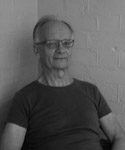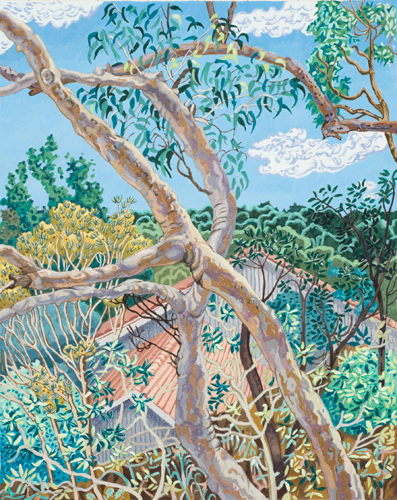 Norm Neill’s poetry has appeared in journals including Five Bells, Blue Dog and Social Alternatives, and in edited anthologies. The Robin Gibson Gallery exhibited 16 of his poems responding to paintings by Jacqueline Balassa in 2010. His poem World Cup Final came second in the 2009 Inner City Life competition. Norm has had more than 700 letters in broadsheet newspapers and in 2011 his poem Post-industrial appeared in The Sun-Herald. He is convenor of a weekly poetry workshop, Youngstreet Poets, at the NSW Writers’ Centre.
Norm Neill’s poetry has appeared in journals including Five Bells, Blue Dog and Social Alternatives, and in edited anthologies. The Robin Gibson Gallery exhibited 16 of his poems responding to paintings by Jacqueline Balassa in 2010. His poem World Cup Final came second in the 2009 Inner City Life competition. Norm has had more than 700 letters in broadsheet newspapers and in 2011 his poem Post-industrial appeared in The Sun-Herald. He is convenor of a weekly poetry workshop, Youngstreet Poets, at the NSW Writers’ Centre.
Norm Neill’s poems have appeared in journals, in edited anthologies and in the Sun-Herald newspaper. He has read at various venues, including the Sydney Writers’ and Newtown festivals. He has been convenor of a weekly poetry workshop for the past thirteen years, and is a member of Youngstreet Poets.
He served on the committee of the Poets Union for five years and on the organising committee of the Blake Poetry Prize for three. He has organised readings and has both judged and been responsible for publicising competitions. He is a life member of the NSW Writers’ Centre and wrote a regular column for Newswrite from 2005 to 2008.
Norm publishes a weekly emailed newsletter listing poetry and poetry-related events in NSW, and has had published two non-fiction books and more than 800 letters to the editors of broadsheet newspapers.
To receive his e-newsletter please contact Norm at his E-mail: normie@exemail.com.au
We love your weekly e-newsletters on upcoming NSW poetry events what lead you to create it?
Funding pressures forced the amalgamation of the Poets Union, based in Sydney, and the Australian Poetry Centre, based in Melbourne to form Australian Poetry, a national body based in Melbourne. Despite several attempts, Australian Poetry has been unable to obtain the funding needed to operate seriously in NSW.
I started the e-newsletter of poetry events in 2012, partly to promote the events and partly to promote a sense of community among poets and poetry lovers in NSW that seems to have waned since the passing of the Poets Union. I’m always happy to hear of new events to add to the newsletter and to add names to the distribution list. There’s no charge for either.
You came to poetry later in life what was your career before and what caused the shift?
I’ve had many jobs. I’ve been a timber feller, tractor driver, truck driver, fruit-and-vegetable packer, shop assistant, door-to-door salesperson, psychiatric nurse, factory labourer, money counter and, after studying for the HSC at night at Sydney Technical College and attending University as a mature-age student, I’ve been a high-school teacher, historian (until I was declared redundant) and a part-time museum guide.
I wrote a handful of not-very-good poems in my 20s, and started very gradually again in 1995, when I was 52. My first poem was for my mother’s funeral. People responded well, and I wrote one or two more, and then it gradually became an obsession.
As an honorary life member of the NSW Writers’ Centre what is your favourite memory of the Writers’ Centre?
I joined the NSW Writers’ Centre in 2002, when volunteers played a much larger role than now. I have two equally favourite memories: the numerous festivals at which I worked as a volunteer, and the poetry workshop groups in which I’ve participated.
What led you to start your poetry workshops, and how do these workshops run?
I started the Wednesday Night Poets workshop group in 2002. Having been made redundant, separated from my then partner, sold the house and moved back to inner Sydney, I tried to join a workshop group, but all those I asked about were full, so I decided to start my own.
We meet every week, which is unusual. Each participant brings copies of a poem and reads it aloud. We then spend roughly 10 minutes discussing each poem and suggesting ways to improve it. From the group’s beginning, we’ve been concerned with improving the quality of our writing, and our critiques, while generally positive, are probably more rigorous than those of some other groups. The group focuses on contemporary and traditional page poetry rather than performance pieces, and doesn’t really meet the needs of bush poets.
What is the best piece of writing advice you’ve been given?
Two equally important pieces of advice: to show, not tell; and to remember that 90 per cent of editing involves cutting something out.
Could you please tell us a little about your writing technique?
I grew up with traditional grammar, syntax and punctuation, and tend to use them in my writing, although I do become mildly experimental at times. Most of my poems have a fairly regular meter. Only a few rhyme. I use metaphor lightly but some of my poems contain a lot of images.
Where do you look for inspiration?
Most often from the experiences of ordinary people, although the contexts may be as varied as the World War Two battle of Stalingrad, a back-street brothel in Sydney or an aeroplane flight over the Indian Ocean. I’m rarely inspired by nature and never by spirituality.

What are you reading at the moment?
Martin Langford’s latest book of poetry, Ground.
Most Inspiring:
Poet? Two equal: W.H. Auden and Carol Ann Duffy
Book? Virginia Woolf’s Mrs Dalloway
Weather? A sunny late-spring day in Sydney
Time of Day? Late afternoon
Music? I’m no expert but I enjoy Beethoven’s and Mahler’s symphonies, and US acoustic folk music.
Location? Café Hernandez, Potts Point (I’ve written the first drafts of several poems there)
A sonnet by Norm published the Australian Poetry Journal:
Innocent Until
There hasn’t been a murder here in years:
the razor gangs have gone, the bookies too
and vice-squads bought with cash, hot goods and beers,
as have the girls who hurried clients through
the brothel managed by a psychopath
shot dead one night by a fiery pimp, whose sun
flared briefly till he died, the aftermath
of third-rate gin. Life changed and no one won.
Now corporate traders share good-humoured meals
in bistros, boasting of the ways they wring
fat profits from their tax-reducing deals
and renovations, scorning anything
suggestive of the days of gangland crime,
conspiring artfully while killing time.
